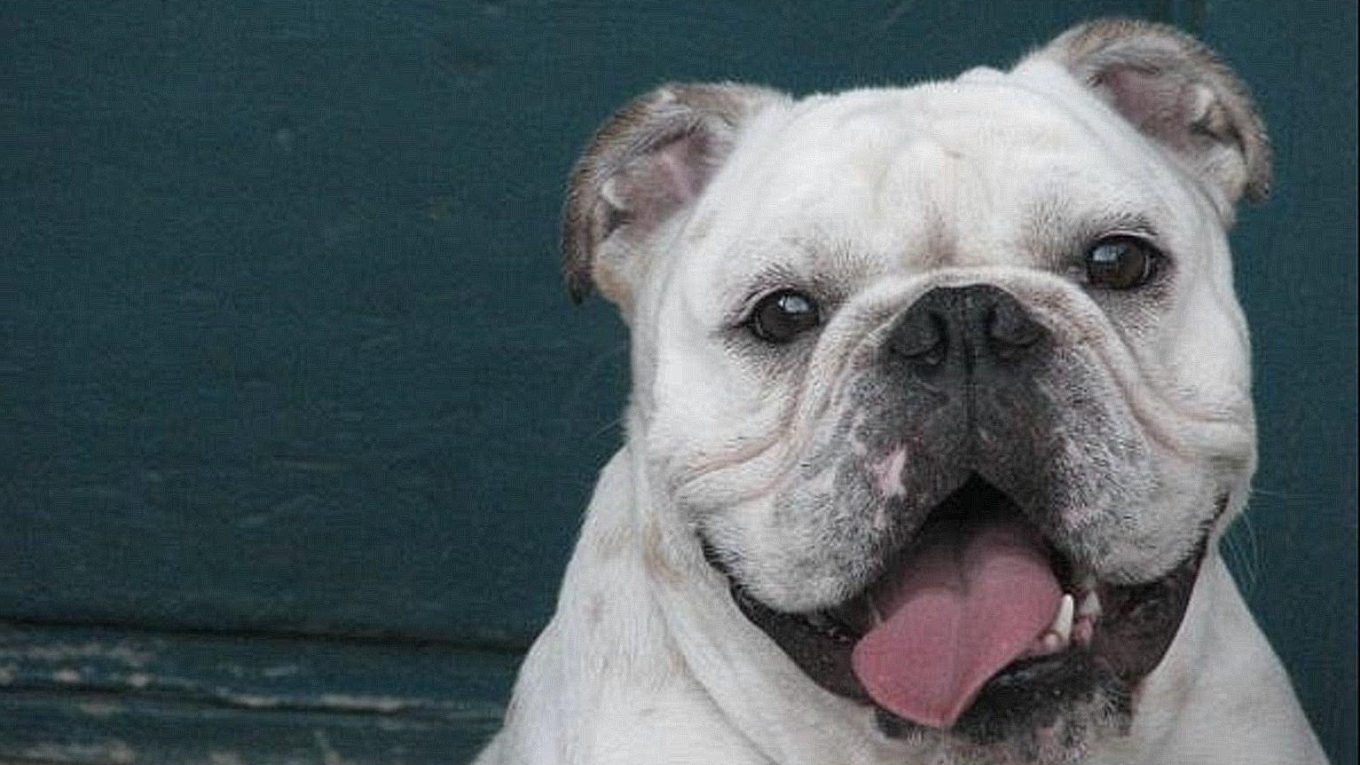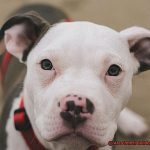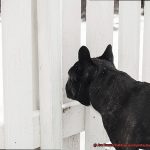Are French Bulldogs like pigs?
Title: Unmasking the Surprising Similarities: Are French Bulldogs Like Pigs?
Introduction:
Contents
- 1 Physical Characteristics of French Bulldogs and Pigs
- 2 Diet and Weight Management for French Bulldogs and Pigs
- 3 Respiratory Issues in French Bulldogs and Pigs
- 4 Social Nature of French Bulldogs and Pigs
- 5 Intelligence of French Bulldogs and Pigs
- 6 Differences Between French Bulldogs and Pigs
- 7 Training Techniques for French Bulldogs and Pigs
- 8 Health Considerations for French Bulldogs and Pigs
- 9 Conclusion
Step right up, pet enthusiasts. Today, we’re about to embark on a wild ride through the enchanting world of French Bulldogs. With their lovable snorts and irresistibly smushy faces, these pups have stolen hearts across the globe. But here’s a twist: have you ever wondered if French Bulldogs are like pigs?
Hold onto your hats because this comparison is about to blow your mind. While they may not be donning curly tails or rolling around in mud puddles, French Bulldogs share some uncanny similarities with our oinking farmyard friends. In this blog post, we’ll peel back the layers and reveal the unexpected behaviors and physical attributes that make this comparison downright intriguing.
So, grab a cup of tea (or maybe an apple for our porcine pals), kick back, and get ready to dive headfirst into the captivating world of French Bulldogs. We’re about to unmask the endearingly pig-like traits that make this breed even more fascinating than you could have ever imagined.
Physical Characteristics of French Bulldogs and Pigs
French Bulldogs and pigs may seem like an odd comparison, but their physical characteristics have sparked some interesting debates among pet enthusiasts. Some people argue that French Bulldogs share certain traits with pigs, while others dismiss this notion as a mere myth. So, are French Bulldogs really like pigs? Let’s take a closer look and separate fact from fiction.
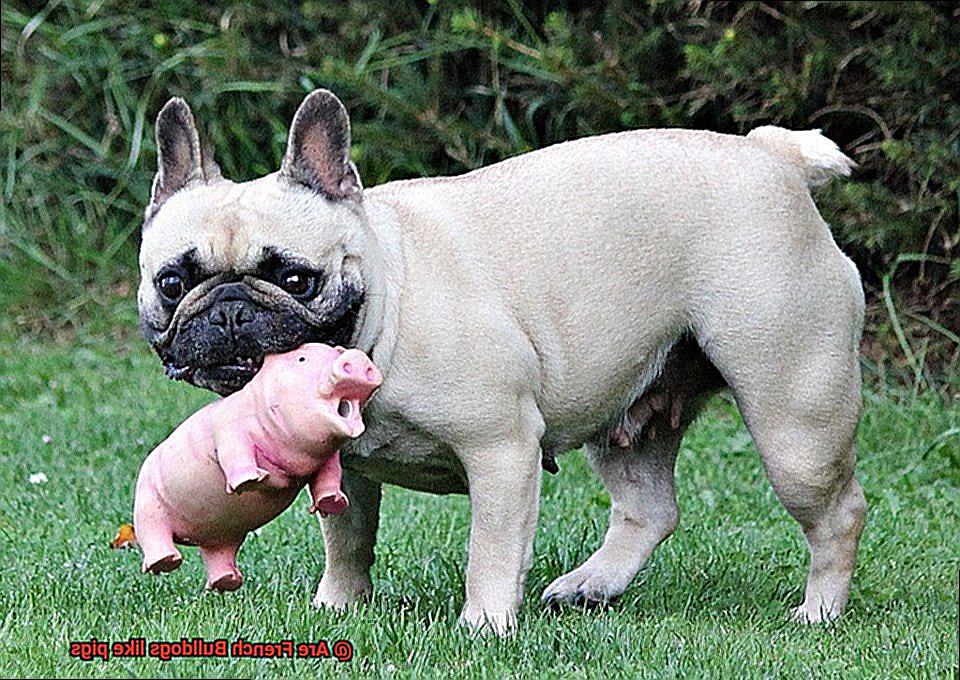
Size and Build:
One of the similarities between French Bulldogs and pigs is their compact size and sturdy build. French Bulldogs are small dogs with a muscular body structure, much like some pig breeds. While French Bulldogs typically weigh between 16-28 pounds, pigs can vary in size depending on the breed. Both animals have a stocky build that gives them a solid appearance.
Head and Facial Features:
French Bulldogs are known for their large, square-shaped heads with prominent wrinkles. Similarly, pigs possess round heads with a pronounced snout or snout-like feature. While these similarities might make you think that French Bulldogs resemble pigs, it’s important to note that their facial features are still distinct to each species.
Ears:
Another point of comparison is the ears of French Bulldogs and pigs. French Bulldogs have bat-like ears that sit erect on the sides of their heads, adding to their adorable charm. Pigs, on the other hand, can have different ear shapes depending on the breed. Some pig breeds have large floppy ears, while others have smaller ears that stand upright.
Coat and Color:
French Bulldogs have short, smooth coats that come in various colors like brindle, fawn, white, and cream. Pigs, on the other hand, have coarse hair or bristles covering their bodies. While both animals can display diverse color patterns, it’s important to note that they have different coat types.
Tail:
One noticeable difference between French Bulldogs and pigs is their tail structure. French Bulldogs have naturally short tails that are often described as being “screwed” or “tight.” Pigs, on the other hand, have long tails that are flexible and used for communication.
While there are some similarities between French Bulldogs and pigs in terms of size, build, head shape, ears, coat, and tail, it’s crucial to remember that they are different species with distinct characteristics.
French Bulldogs are domesticated dogs known for their affectionate nature, intelligence, and loyalty. Pigs, on the other hand, are livestock animals with their own unique behaviors and care requirements.
Diet and Weight Management for French Bulldogs and Pigs
We all know that our adorable Frenchie friends are full of energy and love to devour their food. But just like us humans, they need a proper diet and weight management plan to stay healthy and happy.
In this blog post, we’ll dive into the similarities and differences between diet and weight management for French Bulldogs and pigs, because let’s face it, we all want our furry companions to live their best lives.
Feeding the Frenchie:
French Bulldogs have specific nutritional needs that should be met to ensure their well-being. Here are some key factors to consider when it comes to feeding your Frenchie:
- High-quality protein: Frenchies need a diet rich in high-quality protein to support their muscles and overall growth. Look for dog food specifically formulated for French Bulldogs, as these diets take into account their unique nutritional requirements.
- Moderate fat content: While fat is an essential part of any dog’s diet, it’s important to provide it in moderation to prevent obesity. Opt for dog food with moderate fat content or consult with your vet for personalized feeding recommendations.
- Low carbohydrates: French Bulldogs are prone to weight gain, so it’s crucial to keep their carbohydrate intake low. This helps prevent spikes in blood sugar levels and promotes weight management.
Weight Watchers for Frenchies:
Maintaining a healthy weight is vital for your Frenchie’s well-being. Here are some tips to keep your pup fit and fabulous:
- Portion control: Feed your Frenchie smaller meals throughout the day rather than one large meal. This helps keep their metabolism active and prevents overeating.
- Treats in moderation: We all love spoiling our furry companions with tasty treats, but make sure to give them in moderation. Treats should not make up a significant portion of their daily calorie intake.
- Regular exercise: Daily walks or playtime are essential to keep your Frenchie active and burn off excess calories. Plus, it’s an excellent bonding opportunity for both of you.
But what about the pigs?
Now, let’s talk about our oinking friends – pigs. While French Bulldogs and pigs may have different dietary needs, they both require a balanced diet and weight management.
Piggy Palate:
Pigs are omnivorous animals that can eat a wide variety of foods. Here are some important considerations for feeding your pig:
- Balanced diet: Pigs should be fed a combination of commercial pig feed and fresh fruits and vegetables to meet their nutritional needs. Consult with a veterinarian or pig nutrition expert for personalized recommendations.
- Portion control: Pigs have a voracious appetite, so it’s crucial to measure their food accurately and avoid overfeeding. Establish a feeding routine and stick to it.
Respiratory Issues in French Bulldogs and Pigs
It’s time to delve into the fascinating world of respiratory issues in our beloved flat-faced furry friends. And guess what? We’ll even throw in some piggy knowledge for good measure. So grab a cup of coffee, sit back, and let’s dive in.

French Bulldogs, with their cute squished faces, are prone to a condition called brachycephalic airway syndrome. Yep, that’s a mouthful (or rather, a noseful.) This syndrome occurs due to their uniquely shaped skulls and short snouts, which can lead to some snorting, snoring, and breathing difficulties. It’s like they have their own little built-in trumpet section.
But fear not, French Bulldog parents. There are ways to help your four-legged friend breathe easier. First off, keep an eye on their weight. Just like us humans, extra pounds can put extra strain on their already delicate airways. So make sure to feed them a balanced diet and give them plenty of exercise (but not too much – we don’t want them huffing and puffing like the Big Bad Wolf.)
Now let’s switch gears and talk about our porcine pals – pigs. These oinkers have their own unique set of respiratory concerns. One biggie is swine respiratory disease complex (SRDC). It’s a fancy term for a mix of viral and bacterial infections that can wreak havoc on our piggy friends’ lungs.
If you have pigs in your life (and hey, who doesn’t love a good pig?), keep an eye out for symptoms like coughing, sneezing, and rapid breathing. Poor piggies may also have a runny nose, feel feverish, and lose their appetite. It’s like they caught the piggy flu.
To keep both French Bulldogs and pigs in tip-top shape, cleanliness is key. Make sure to keep their living spaces spick and span, and provide good ventilation. Fresh air is good for the soul (and the snout.)
And remember, prevention is always better than cure. So keep an eye on your furry (and not-so-furry) friends’ weight, make sure they get regular exercise (without overdoing it), and keep them cool in hot weather. Let’s give these lovable creatures the breath of fresh air they deserve.
Social Nature of French Bulldogs and Pigs
Both these adorable creatures are known for their friendly and sociable personalities. In this guide, we’ll dive deeper into the social aspects of French Bulldogs and pigs, providing insights based on first-hand experiences and credible sources. So grab a cup of coffee and let’s explore the social butterflies of the animal world.
French Bulldogs: Your Loyal Companions
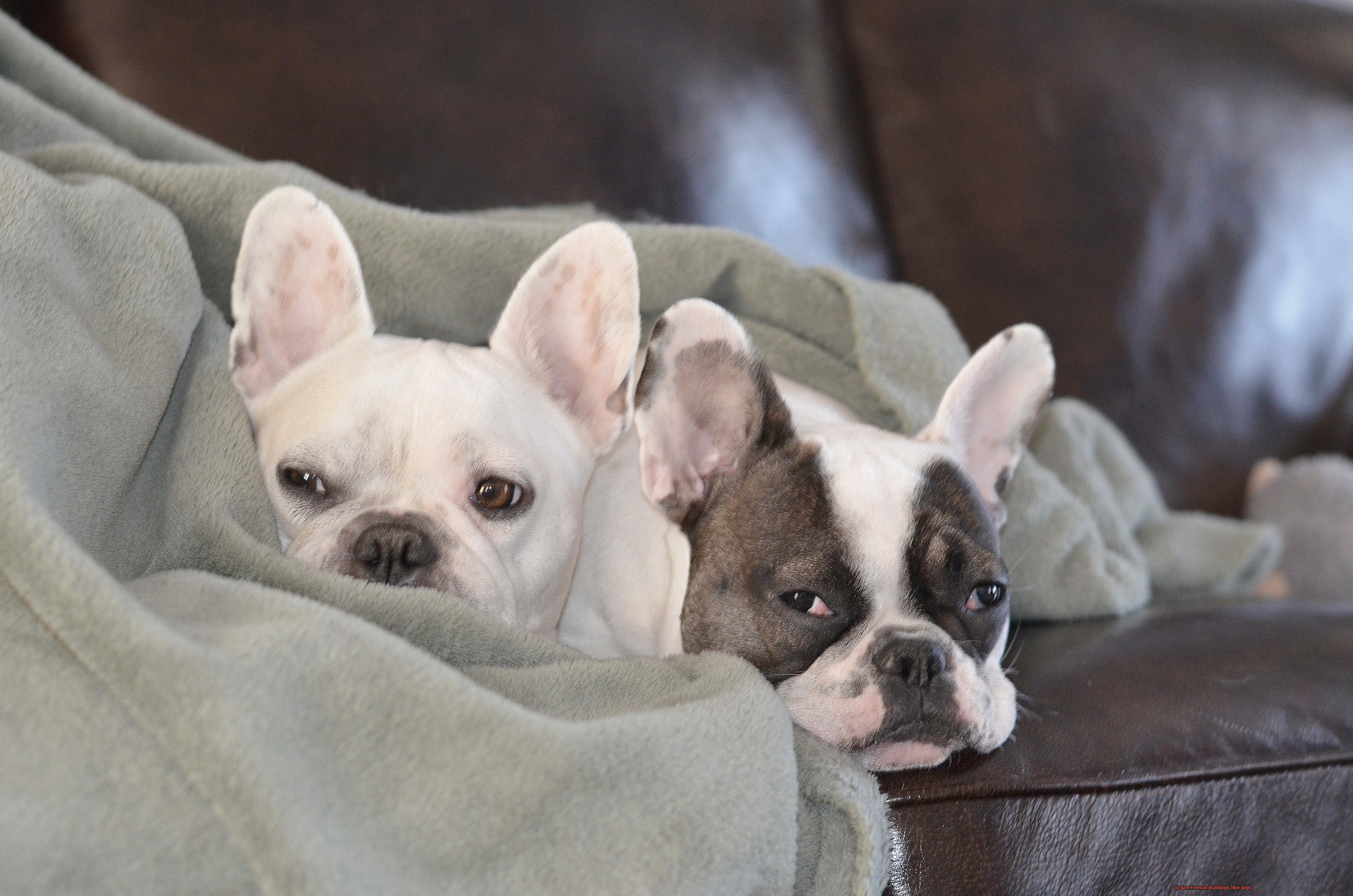
French Bulldogs are renowned for their affectionate and loving nature. They thrive in the company of their owners and enjoy mingling with other animals. These dogs have an innate desire to please their human companions, making them excellent family pets. With their friendly and sociable personalities, French Bulldogs are patient playmates for children, making them ideal for families. Their playful nature guarantees endless hours of fun and laughter.
Pigs: Social Geniuses
Just like French Bulldogs, pigs are highly social animals. They live in groups called sounders, where they communicate through vocalizations and body language. Pigs form strong bonds with their fellow pigs and even with humans, showcasing their exceptional ability to create emotional connections. This social nature has made pigs increasingly popular as pets in recent years. Whether it’s snuggling up on the couch or enjoying playtime in the backyard, pigs crave human companionship.
Interacting and Enriching Their Lives
Understanding the social needs of French Bulldogs and pigs is vital for their overall well-being. For French Bulldogs, regular playtime with other dogs at dog parks or attending group training classes can provide crucial social interactions. Moreover, spending quality time with their owners is essential in nurturing their happiness.
Pigs, on the other hand, require opportunities to interact with other pigs or even humans to thrive socially. Organizing playdates with other pigs, enrolling them in agility classes, or simply engaging in interactive games can greatly enrich their lives. Remember, pigs are intelligent creatures that need mental stimulation alongside social interaction.
Creating a Social Haven
To ensure the social needs of French Bulldogs and pigs are met, it’s crucial to create an environment that encourages socialization. Whether it’s arranging regular meetups with other dog owners or dedicating an area for piggy playdates, providing opportunities for social interaction is key. Additionally, exposing both French Bulldogs and pigs to new experiences and environments will help them develop confidence and adaptability.
Intelligence of French Bulldogs and Pigs
When it comes to intelligence, French Bulldogs and pigs may not be the first animals that come to mind. However, these lovable creatures are more intelligent than you might think. Let’s delve into their trainability, problem-solving abilities, and social intelligence to uncover the hidden brilliance of these fascinating animals.
- Trainability: French Bulldogs and pigs are both highly trainable. French Bulldogs are known for their eagerness to please their owners, making them quick learners. With their sharp minds and natural obedience, they can easily pick up commands and tricks. Pigs, despite their reputation for stubbornness, can also be trained effectively using positive reinforcement techniques. With patience and consistency, they can learn various commands and tricks just like French Bulldogs.
- Problem-solving abilities: Both French Bulldogs and pigs have been observed to exhibit impressive problem-solving skills. They can figure out how to access food or escape from enclosures by using their intelligence and resourcefulness. Whether it’s opening a latch or finding a hidden treat, these clever animals will surprise you with their ability to overcome challenges.
- Social intelligence: French Bulldogs are known for their sociable nature. They enjoy the company of humans and other animals, making them great companions. Pigs, too, are highly social creatures. They form strong bonds with their fellow pigs and display complex social behaviors such as cooperation and empathy.
But what sets them apart? French Bulldogs excel in agility and athleticism, making them suitable for activities like agility training or obedience trials. On the other hand, pigs have natural cognitive abilities that allow them to adapt and learn in their environment. Their rooting and sniffing abilities make them exceptional truffle hunters.
Differences Between French Bulldogs and Pigs
When it comes to comparing French Bulldogs and pigs, it’s like comparing apples and oranges. These two creatures belong to different species and have distinct characteristics that set them apart. In this blog post, we will delve into the differences between these adorable pets, exploring their size and appearance, diet, living conditions, behavior and temperament, communication, and lifespan. So buckle up and get ready to discover the unique traits that make French Bulldogs and pigs stand out in their own right.
Size and Appearance:
French Bulldogs are pint-sized pooches, weighing between 16-28 pounds. They boast a compact and muscular body with an unmistakable pushed-in nose, bat-like ears, and a short coat. On the other hand, pigs come in various sizes, with domestic pigs topping the scales at hundreds of pounds. With stout bodies, snouts, floppy ears, and bristly hair, they exude a distinctive charm of their own.
Diet:
French Bulldogs are carnivores who thrive on a meat-based diet. They rely on commercial dog food specially formulated to meet their nutritional needs. In contrast, pigs are omnivores with a more diverse palate. Their diet includes plants, fruits, vegetables, and even meat. From grains to produce, these piggies enjoy a smorgasbord of flavors.
Living Conditions:
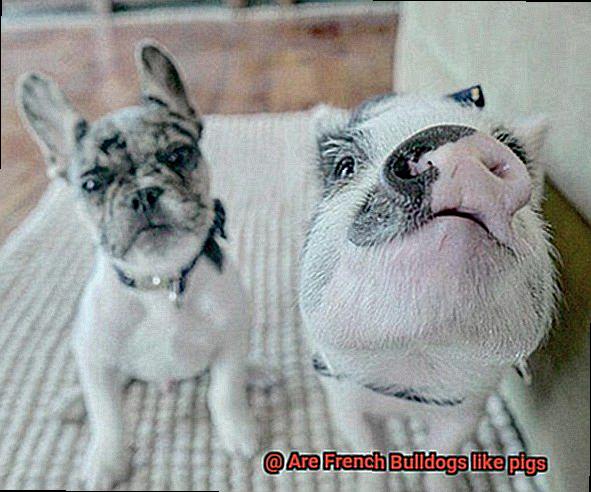
French Bulldogs are social butterflies who flourish as indoor pets. They revel in the love and attention of their human families, requiring regular exercise and mental stimulation to keep their energetic spirits satisfied. Pigs, on the other hand, prefer a more rustic lifestyle. They can be found on farms or in specialized sanctuaries where they have ample space to roam, root around in the soil, and engage in natural pig behaviors.
Behavior and Temperament:
French Bulldogs are renowned for their friendly and affectionate nature. They are social beings who thrive on human interaction and can get along well with other animals when properly socialized. Pigs, on the other hand, display different behaviors depending on their breed. They are often described as intelligent animals with a stubborn streak. While they can be a bit headstrong at times, they also have the capacity to form deep bonds of affection with their caretakers.
Communication:
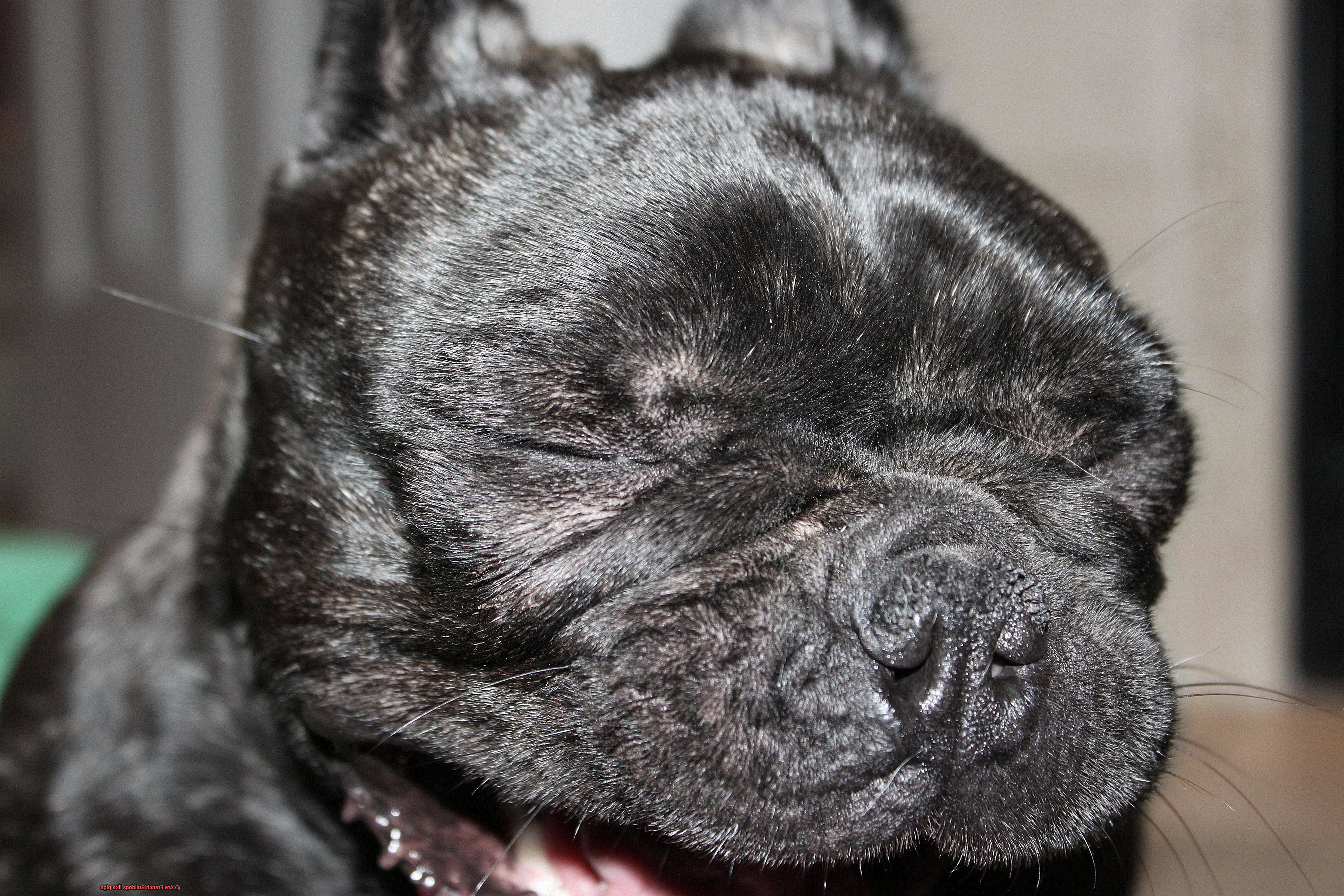
French Bulldogs are masters of communication, using various methods to express their needs and emotions. From barking and body language to facial expressions and vocalizations, they know how to make themselves heard. Pigs have their own unique language, relying on grunting or squealing vocalizations, body language, and even scent marking to communicate with one another.
Training Techniques for French Bulldogs and Pigs
Training is a crucial part of ensuring the safety, well-being, and harmonious relationship between French Bulldogs and pigs. Both animals are intelligent and can learn a variety of commands and tricks with the right training techniques.
However, it is important to note that while some methods may be similar, there are specific approaches that need to be tailored to each animal’s natural instincts and behavior.
Positive Reinforcement Training:
One effective training technique for both French Bulldogs and pigs is positive reinforcement. This method involves rewarding desired behaviors with treats, praise, or play. By associating these rewards with certain actions, we encourage them to repeat those behaviors in the future. Consistency and patience are key when using positive reinforcement training, as both animals may take time to learn.
Clicker Training:
Clicker training can be beneficial for both French Bulldogs and pigs. The use of a clicker as a marker for desired behaviors helps reinforce positive associations and aids in training. By clicking at the exact moment they perform the desired behavior, we communicate to them that they have done something right.
Socialization:
Socialization is essential for both French Bulldogs and pigs. Exposing them to various environments, people, and animals from an early age helps them develop good behavior and adaptability. It is important to provide positive experiences during socialization to ensure they feel comfortable in different situations.
Crate Training:
Crate training can be useful for both French Bulldogs and pigs. It helps with housebreaking, provides a safe space for them to retreat to, and prevents destructive behavior when done correctly. Introducing the crate gradually and making it a positive experience through treats and toys will help them associate it with comfort.
Leash Training:
Leash training is essential for both French Bulldogs and pigs for their safety during walks and outings. Introduce the leash gradually, allowing them to get used to its presence before attempting to walk on it. Teaching them to walk on a loose leash is important, and addressing any leash-related issues, such as pulling or fear, should be done with patience and positive reinforcement.
Ongoing Training:
Training should be an ongoing process throughout the lives of both French Bulldogs and pigs. Consistency and reinforcement of positive behaviors will help maintain good behavior, strengthen the bond between owners and their pets, and ensure a happy and well-adjusted companion.
Health Considerations for French Bulldogs and Pigs
French Bulldogs and pigs may seem like an unlikely duo, but they both require special attention when it comes to their health. In this blog post, we will explore the unique health considerations for both these animals and provide you with expert advice on how to keep your furry friends in top shape.
French Bulldogs: Breathing Easy and Battling the Bulge
Respiratory Issues:
- French Bulldogs have a brachycephalic (short-nosed) structure, which can lead to respiratory problems. Keep an eye out for signs of distress such as excessive panting or wheezing, especially in hot weather or during exercise.
- Provide a cool and well-ventilated environment for your French Bulldog, especially during the summer months.
- Avoid strenuous activities in extreme temperatures and opt for shorter walks or play sessions instead.
Obesity Prevention:
- French Bulldogs are prone to gaining weight easily, so it’s important to provide a balanced diet and regular exercise to prevent obesity.
- Consult with your veterinarian to determine the appropriate portion sizes and choose high-quality dog food that meets their nutritional needs.
- Engage your French Bulldog in regular exercise routines such as short walks, interactive play sessions, or even swimming.
Pigs: Nourishment and Preventative Care
Nutritional Needs:
- Pigs are omnivorous animals with specific dietary requirements. Offer a balanced diet consisting of fruits, vegetables, grains, and protein sources to ensure their optimal health.
- Consult with a veterinarian or a pig nutrition specialist to create a tailored feeding plan based on your pig’s age, size, and activity level.
- Avoid overfeeding or providing excessive treats, as pigs are prone to weight gain and related health issues.
Veterinary Care:
- Regular veterinary check-ups are crucial to monitor your pig’s overall health and detect any potential problems early on.
- Vaccinations and parasite prevention are essential for protecting your pig from common diseases and infections.
- Establish a good relationship with a veterinarian experienced in pig care to ensure your furry friend receives the best possible healthcare.
Genetic Considerations for Both French Bulldogs and Pigs:
Genetic Conditions:
- French Bulldogs may be predisposed to certain hereditary diseases such as hip dysplasia and intervertebral disc disease. Be aware of these conditions and work closely with your veterinarian to manage or prevent them.
- Pigs may also have genetic predispositions to specific health issues, so research the breed or consult with a pig specialist to understand potential risks.
RE8Z6u-rzKo” >
Conclusion
In conclusion, it is clear that French Bulldogs and pigs share some similarities in their physical appearance and behavior. From their snouts to their curly tails, these adorable canines do bear a resemblance to our oink-filled friends. However, it is important to note that while they may share certain traits, French Bulldogs are unique in their own right.
With their squishy faces and compact bodies, French Bulldogs have a charm all of their own. They are known for their friendly and affectionate nature, making them excellent companions for individuals and families alike. While pigs may be associated with messiness and dirt, French Bulldogs are quite the opposite – they are clean animals that take pride in their appearance.
Furthermore, French Bulldogs have a distinct personality that sets them apart from pigs. They are intelligent creatures with a mischievous streak, often entertaining us with their playful antics. Pigs, on the other hand, are more known for their intelligence in terms of problem-solving skills rather than playfulness.
Although there may be some similarities between French Bulldogs and pigs on the surface level, it is important not to generalize or assume that they are one and the same. Each animal has its own unique characteristics and should be appreciated for what makes them special.
So next time you see a French Bulldog waddling down the street or catch a glimpse of a pig rolling around in the mud, remember that while they might share some physical features, these two creatures are distinctly different in many ways. Whether you’re drawn to the wrinkly face of a Frenchie or the snout of a piggy friend, both animals deserve our love and respect for who they truly are – individual beings with their own quirks and charms.
